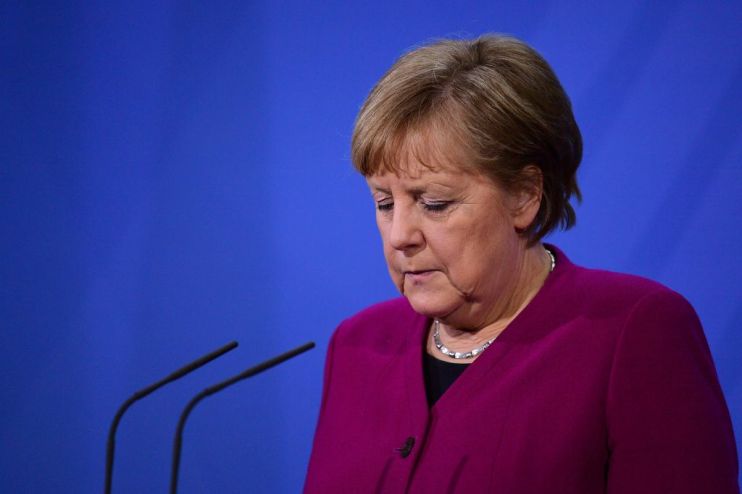Angela Merkel apology: Is Entschuldigung still the hardest word?

“Never apologise, never explain.” The originator of that pithy advice is disputed, but it has become something of a credo for politicians.
To say sorry in anything but the blandest terms is deemed to be fatal to the career, because it admits error, and there is a widespread belief, often borne out by fact, that confessing to a mistake is shattering the image of invincibility.
Certainly we have a prime minister for whom the genuine apology is not an option. In January, he played with fire by saying he was “deeply sorry for every life that has been lost” to Covid-19, adding that “as I was prime minister I take full responsibility for everything that the government has done”. But this was negated by his insistence that “we truly did everything we could… and we will continue to do that”. Sorry, then, but not sorry for doing anything wrong.
This made it all the more surprising when the German chancellor, Angela Merkel, this week reversed a decision to impose a strict lockdown over Easter, and apologised for her initial decision. The plan had been met with stiff resistance: her own CDU party leader, Armin Laschet, had said that the lockdown was “not enforceable in this form”, while the Free Democrats agitated for a vote of no confidence to be tabled in the Bundestag.
Dr Merkel not only took a swift decision to abandon the policy, which is merely good politics. She apologised and took full responsibility, but in a much more meaningful way than Boris Johnson had done in January.
“I apologise to all citizens,” the chancellor said. “To put it bluntly, the idea of an Easter shutdown was designed with the best of intentions… But it was a flawed idea. This mistake is solely my fault, because in the end I have the ultimate responsibility as chancellor.”
The differences are obvious. Look at her language: “flawed”, “mistake”, “fault”. It is difficult to imagine a British politician, let alone one with the prime minister’s ironclad self-confidence, using words like these.
It can be argued that Dr Merkel has little to lose. She has long signalled her intention to retire at the next federal election later this year, and has already stepped down as leader of her Christian Democrat Union. She has also stressed that she intends to seek no further political office. Her only audience now is posterity, and its longer view will judge her on more than one decision made in the conditions of a global pandemic.
The apology remains worth examining, however.
Angela Merkel is, we are often reminded, a scientist: she gained a doctorate in quantum chemistry in 1986 (on the mechanism of decay reactions with single bond breaking and calculation of their rate constants) and pursued an initial career as a researcher, producing learned papers and speaking at conferences. Her background has left its mark. She is cautious, and often mocked for it by a press which craves the bold strokes of big-picture policy, and her style is downbeat, solid, thorough.
‘Mutti’ may, however, in the twilight of her leadership, have shown an important truth. Mistakes should not be the great unmentionables of politics: in fact, they are critical to long-term success. We tend to use the phrase “trial and error” dismissively, but it is the basis of science. Experimentation tests theories and exposes their flaws. If they survive the cauldron of experience, they have demonstrated that they are robust and workable, and can be used as the springboard for greater development. This is, in essence, the scientific method.
We are all complicit in the condemnation of honest apologies. We demand them of our leaders, sometimes howl for them as for sacrificial blood, yet we are also unforgiving. You may have said sorry, yells the crowd, but you have now put yourself beyond the pale. Apologise, resign, disappear. When we treat admissions of failure so harshly and so ruthlessly, we can hardly be surprised if politicians cling to an insistence of being right like a drowning man to a lifebelt.
Perhaps Dr Merkel’s frank and fulsome apology and acceptance of responsibility will be a model, or at least a cause for reflection, for politicians everywhere. The pandemic has brutally exposed some of the shortcomings of our political system, in terms of decision-making, frankness, competence and morality. There is a mood for improvement, for making things better in a systemic way. As alcoholics across the world know, the first step to recovery is admitting you have a problem.
Let us keep Mutti in mind as we go forward, then, because, knowingly or not, she has put her chemist’s finger on the nub of the matter. Life is a learning experience, or should be, and mistakes are valuable provided that we use them as lessons, rather than embarrassments to be denied or forgotten. What Chancellor Merkel has exposed is something we know but have failed to articulate or accept. She has shown us the power of failure.